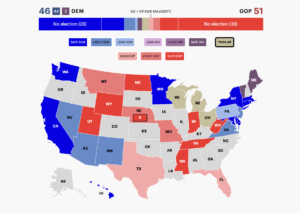 DUSTIN FRANZ/AFP via Getty Images
DUSTIN FRANZ/AFP via Getty Images
The 2024 election has focused almost entirely on the tight competition between former President Donald Trump and Vice President Kamala Harris, but multiple Senate races — which will determine which party controls the chamber — are also neck-and-neck.
While projections and polling don’t win or lose elections, they do show the most viable path forward for each party. And with just 18 days until Election Day, the most accessible road to control of the Senate is the road under Republicans’ feet.
Currently, Democrats hold control of the Senate with 51 lawmakers, including four independents, in their caucus. Independent West Virginia Sen. Joe Manchin’s decision to retire, along with Montana Democratic Sen. Jon Tester facing a tough GOP challenger, put Democrats in a difficult spot to maintain control.
According to Cook Political Report’s Senate race ratings, Republicans are favored to flip the seats in West Virginia and Montana. If those two races go in the Republicans’ favor, and the GOP holds on to the seats in races they are projected to win, Republicans would be at a 51-seat majority.
Cook Political Report also currently rates the races for the Democrat-held seats in Michigan, Ohio, and Wisconsin as “toss-ups,” giving the GOP an even wider window to take control of the Senate. None of the races where a Republican currently holds the seat are rated as a “toss-up,” according to Cook Political Report. Democrats’ best chance to flip a Senate seat comes in Texas with Democratic Rep. Colin Allred facing Republican Sen. Ted Cruz, but even in that race, Cruz holds a four-point lead over his Democrat opponent, per the RealClearPolitics average.
The best path for Democrats to maintain control of the Senate would require that the party holds onto each of the “toss-up” seats while also pulling off an upset in one of the “lean or likely Republican” races: Montana, Texas, or Florida.
Here is the 2024 Senate map based on Cook Political Report’s ratings (brown = toss-up):

Make your own Senate map on The Daily Wire’s Election Hub
The only other Senate race in which Democrats could come close, according to projections, is in Florida — where Republican Sen. Rick Scott is running for a second term. According to the RCP average, Scott holds a 6-point lead over Democrat Debbie Mucarsel-Powell.
In Nebraska, Republican Sen. Deb Fischer is running for a third term against an independent candidate. The Nebraska Senate race has flown under the radar, but it could be close as some polls show independent Dan Osborne leading Fischer. Osborne said he would not accept an endorsement from the Democratic Party in the race, adding that he would not caucus with either party if he wins the Senate seat. Even though he’s not a Democrat, an Osborne win in Nebraska would make the GOP’s path to Senate control more complicated.
Republicans would also gain control of the Senate if it splits 50-50 and Trump and his running mate Sen. JD Vance (R-OH) win the presidential election. If Vance ascends to the vice presidency, Ohio’s Republican Gov. Mike DeWine would appoint his successor until a special election could be held in 2026. Democrats would maintain control of the Senate in a tie if Harris and Gov. Tim Walz win.
MATT WALSH’S ‘AM I RACIST?’ COMING TO DAILYWIRE+ OCT. 28
In Michigan, Republican Mike Rogers, a former congressman, has closed the gap in polling against Democrat Rep. Elissa Slotkin. The Michigan Democrat only holds a 2.7-point lead in the RCP average after leading Rogers by 5 points in mid-September. Earlier this month, the Wisconsin race between Republican Eric Hovde and Democratic Sen. Tammy Baldwin moved from “lean Democrat” to “toss-up,” according to Cook Political Report. The Ohio Senate race between Democratic Sen. Sherrod Brown and Republican Bernie Moreno is also considered a “toss-up,” as Brown leads by fewer than 3 points, according to the RCP average.
Republicans have a chance to pull off upsets in Arizona, Nevada, and Pennsylvania, all seats currently held by Democrats and an independent who caucuses with the Democratic Party. Those three races all lean in Democrats’ favor, according to the polls. In Arizona, Democrat Ruben Gallego leads Republican Kari Lake by 6.4 points, according to the RCP average. The average of polls also gives Democratic Sen. Jacky Rosen a 5.5-point lead in Nevada over Republican Sam Brown, and Sen. Bob Casey (D-PA) has a 3.8-point lead over Republican Dave McCormick in the Keystone State.
Source link

